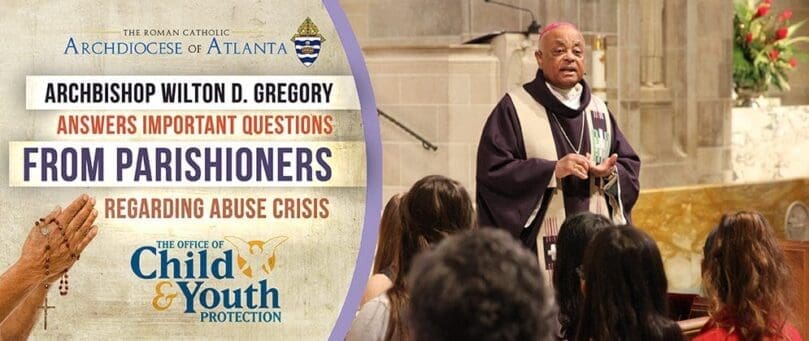
Atlanta
Archbishop Gregory updates Catholics on fall bishops’ assembly, abuse crisis
By GEORGIA BULLETIN STAFF, editor@georgiabulletin.org | Published December 6, 2018 | En Español
ATLANTA—Many parishioners in churches across the Atlanta Archdiocese have recently met together for prayer and to share their concerns in an open or town hall format regarding the abuse crisis. Questions from these sessions have been sent from parishes to Archbishop Wilton D. Gregory, who has answered them in a series of articles.
Previous installments of questions and answers may be found online.
If your parish conversations have generated additional questions not answered here or in previous editions, please submit them to your parish office and have them sent to Archbishop Gregory’s office at the Chancery in Smyrna.
Here, the archbishop discusses the November meeting of the American bishops in Maryland:
What happened at the USCCB Baltimore meeting, and where to from here?
The wife and mother of a family that I have come to know and love over the past fourteen years was among the many who asked me this question. She is not alone in being perplexed, disappointed and angry at the turn of events at the November meeting of the United States Conference of Catholic Bishops in Baltimore. A number of things happened in Baltimore well beyond the voting delay that the Holy See required from the bishops of our nation. Expectations were exceedingly high that we bishops would take bold action to begin correcting and resolving the question of accountability of episcopal leadership and clandestine behavior that has been too much the catalyst for this disgrace.
Catholics and non-Catholics alike anticipated that the bishops would take serious actions to acknowledge and to address the pain that victims and survivors of the sexual abuse of minors continue to endure. As Americans, we expected a resolute response to the shame that the Catholic Church continues to bear.
People wanted clear action and credible explanations. We were not anticipating a further delay. The meeting in Baltimore revealed several things beyond those delayed votes. Baltimore reminded us that we are a universal Church. One community of the Church—even one so blessed as we are in the United States—could not propose a resolution to such a critical concern in isolation, lacking the wisdom and experience of other local communities.
Baltimore also acknowledged that this is not purely “an American problem.” During the thirteen trips I made to Rome as President of the USCCB from 2001-2004, I heard repeatedly from many curial officials that the issue of the sexual abuse of minors by clergy was exclusive to the United States. I did not believe that then and I certainly do not believe it now.
Baltimore revealed that the body of bishops in the United States are divided over how best to accomplish accountability for and transparency in episcopal governance. Even though there was no formal vote taken, the discussions that ensued made it obvious that we could not have achieved the necessary majority to enact a formal policy even if we had taken such a vote.
Finally, Baltimore laid the foundation for our United States participation in the forthcoming Vatican summit of the presidents of episcopal conferences from throughout the world in February. Pope Francis has appointed a first-class team to organize this February meeting, including Cardinal Blase Cupich of Chicago, Archbishop Charles Scicluna of Malta, Cardinal Oswald Gracias of Mumbai, and Father Hans Zollner, SJ, among others. The disillusionment with the outcome from Baltimore has heightened the expectations for this February encounter even more so than for the November Baltimore assembly. People in our nation and elsewhere want this matter resolved and resolved conclusively. Much is riding on this February gathering.
I have been appointed to a consultative committee comprised of the active former presidents of the USCCB, which also includes Cardinal Timothy Dolan of New York and Archbishop Joseph Kurtz of Louisville. It will be chaired by the current Conference President, Cardinal Daniel DiNardo of the Archdiocese of Galveston-Houston. We are still defining how we might work together to monitor the issues that the February gathering will address and then to assist with the implementation of the outcomes. I guarantee you that there is no bishop in the United States more committed to continuing and completing the important work that we began in 2002 than me, and I assure you of my passionate resolve to reestablish trust in the leadership of our beloved Catholic Church.